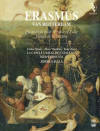Texte paru dans: / Appeared in: |
||||
|
Reviewer: Ivan
Moody This monumental collection is a celebration of the life and impact of Erasmus, visionary of the global village ahead of his time (‘The whole world is the common fatherland of all’). As a true European, it is readily apparent why such a figure would be suitable material for a project by Jordi Savall, and he himself explains the importance of Erasmus in an introduction to this luxurious collection, which is followed by no fewer than five essays – by Jean-Claude Margolain, Jean-Christophe Saladin, Hans Trapman, Ricardo García Cárcel and Alexandre Vanautgaerden – on various aspects of the great man’s life and work. Six SACDs are included, which are in fact two sets of three, one containing only the music chosen by Savall, the other that same music with recitations, by Louise Moaty, Marc Mauillon and René Zosso, of texts from the period, by Erasmus himself, Thomas More, Machiavelli and Luther. The first disc, with recitations by Moaty of texts from Erasmus’s youthful work Laus stultitiae (‘In Praise of Folly’), inevitably contains many versions of the folia, as well as a great variety of other music, ranging from Encina and Tobias Hume to some wonderful improvisations (as one has come to expect of Hespèrion XXI), both solo and ensemble. These are of course better appreciated in themselves without the narration; but with the recited texts one listens in an entirely different way. Particularly touching is the inclusion of tracks featuring the late Montserrat Figueras; it should be said that the recordings included here are a mixture of old (some going back as far as 1988) and new. But that seems entirely appropriate for such a large-scale project, providing as it does a conspectus of Hespèrion’s work over a long period and bringing together members past and present. The second disc, ‘Time of Reflections’, exploring Erasmus’s career as ‘a great humanist’, and the third, ‘Time of Confrontations’, whose title is self-explanatory, feature Marc Mauillon reading Erasmus’s own words and René Zosso reading those of Luther, More and Machiavelli. The range of music on the second disc is huge, including an Ottoman march, Sephardic music and reaching as far as Josquin. Two moments stand out particularly – the very moving performance of Josquin’s Fortuna desperata and the narration by Mauillon of the Epitaph for Ockeghem, followed immediately by Josquin’s Déploration sur la mort d’Ockeghem. The diverse confrontations of the third disc include the Ottoman invasion of Syria, Palestine and Egypt, symbolised here by Cantemir’s taksim amd maqam Rast Marass’a and Luther’s affixing of his 95 theses to the castle church door in Wittenberg, which provides opportunity for letters between Luther and Erasmus and a sequence of music including works by Isaac, Du Caurroy and Hassler. The final sequence, the death of Erasmus, is most affecting of all, including two readings from Stefan Zweig, Tye’s In nomine ‘My Death’, the Pie Jesu from Morales’s Requiem and Appenzeller’s lament on the death of Erasmus, Plangite pierides. This extraordinary collection is truly a feast of (Erasmian) reason and beauty.
|
||||
|
||||
|
|
|
|||
|
Cliquez l'un ou l'autre
bouton pour découvrir bien d'autres critiques de CD |
||||




